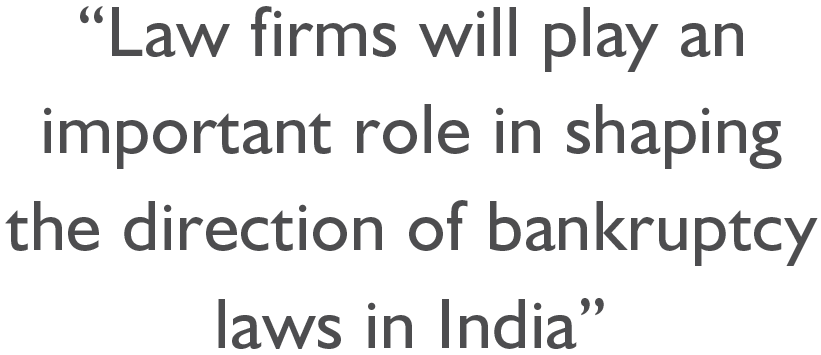India continues to be one of the world’s high-growth economies. Post liberalisation, many new reforms and regulations have been introduced to support economic growth and build the confidence of international investors. However, one area that was always neglected was bankruptcy law.
India’s corporate environment is very promoter-centric, and likely to remain so. As international firms made their entry into the country, promoters sought tie-ups with global partners through alliances and M&A. However, the intent of promoters was always to continue being involved and also lead the business. Lack of transparency in financial reporting, poor governance standards and lengthy litigation processes meant promoters remained largely unharmed in a situation where they were carrying out fraudulent practices. The siphoning of funds out of the companies by promoters for personal use has often resulted in the businesses going under and the bankers and investors having to bear the brunt. Multiple resolution mechanisms such as the Board of Industrial & Financial Resolution, corporate debt restructuring and debt recovery tribunals were introduced but did not have the expected effect.
With the introduction of the new Insolvency & Bankruptcy Code (IBC) earlier this year, the situation is now looking different. The current government, with its intent to improve governance standards in the country, has introduced a law under which defaulting companies will undergo a time-bound bankruptcy process resulting in either resolution or liquidation. However, it is important to ensure that the IBC is implemented in its true spirit, or it risks the same fate as its predecessors. Multiple stakeholders have to play an important role in this implementation, none more important than the legal profession. Especially now, when the law is young and open to multiple interpretations, the role of the legal profession becomes even more critical. The IBC is also undergoing changes and requires continuing review. Under the current IBC process, law firms are actively engaged by various stakeholders in the following ways:

Insolvency resolution professionals (IRPs) — Under the IBC, IRPs are mandated to take control of day-to-day functioning of the defaulting company. It is the responsibility of the IRP to keep the company as a going concern and manage all stakeholders for which they need continuing guidance from their legal advisers. Further, as the IRP has significant personal liability, every decision will be scrutinised and hence legal advice on potential impact and possible roadblocks becomes critical.
Regulators — IBC led to the birth of the Insolvency & Bankruptcy Board of India (IBBI), the body responsible for regulating the IRPs and the Resolution proceedings. Legal professionals supported IBBI in putting together the IBC. They are also constantly engaged with other regulators in making amendments to their respective regulations to accommodate IBC and also represent them in related matters.
Potential investors — Stressed asset opportunity has resulted in an increased investor interest in India. While the opportunity is large, investors need to assess the potential opportunity within the confines of IBC. As the code itself is new, investors are unable to fully interpret the same. Further, asset acquisition is a complex process and requires multiple layers of structuring. In both these scenarios investors are seeking guidance from law firms.
For years, Indian law firms have been trusted advisers to their clients, especially the promoters. Now the legal industry has an opportunity to make a significant effect at policy level. Successful implementation of the bankruptcy code will not only enhance India’s position as an attractive investment destination but will send a strong message toward India’s intent to improve its governance architecture. Failure will deepen the belief that such measures are only an eye wash. Either way, law firms will play an important role in shaping the direction of bankruptcy laws in India.



 W:
W: 

















 Kroll
Kroll Tadashi Kageyama
Tadashi Kageyama







